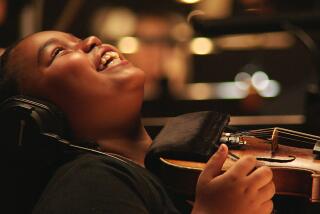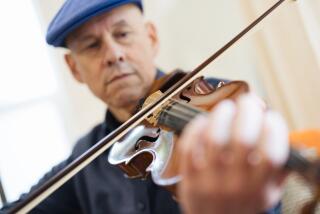Beverly Hills teacher finds violin and Vivaldi in a time of war
I teach violin in Beverly Hills, and this summer I received an unusual request.
Jonathan Hollander, a choreographer and founder of the nearly 40-year-old Battery Dance Company in New York, contacted me through mutual friends. Hollander was looking for a violin teacher for a 24-year-old student in Erbil, Iraq.
What persuaded me to accept was that “this particular student’s heart was broken when he couldn’t continue to take violin lessons.”
Hollander is not naive. He subscribes to Leonard Bernstein’s philosophy: “Art never stopped a war… art cannot change events. But it can change people.” Battery Dance Company’s educational program Dancing to Connect has been conducted in more than 40 conflict zones, including Iraqi Kurdistan, where the company’s teaching artists have brought together Kurds, Shia, Sunni and Christians. They’ve had workshops with mixed groups of Israelis and Palestinians. As Hollander says: “You can’t dance with someone you distrust.”
Others also have used cultural diplomacy to help sort out conflict. In 1999, Daniel Barenboim and the late Edward Said founded their West-Eastern Divan Orchestra, bringing together young Israelis and Palestinians and other Arabs.
Hollander’s latest enterprise is to match private teachers with students in war-torn countries. Since I began teaching my student, whom I will call Mustafa for his protection, Hollander has taken on mentoring a young choreographer in Baghdad and arranged for Diane Walsh, a concert pianist in Portland, Maine, to begin teaching an advanced piano student in Erbil.
Curious about a student desperate to continue violin lessons in the midst of chaos, I checked out Mustafa’s Facebook page. It shows a handsome, laid-back-looking young man with his beloved violin beside him. He could be anywhere in the world.
In an email, Mustafa acknowledged that he had not touched his violin in months, “too busy about ISIS. Bad people don’t want to listen to music. No energy to play. We have a bad situation in my country as every one in the world knows about the war in Iraq but it isn’t my reason because I don’t count myself an Iraqi person, I am Kurdish and I live in Kurdistan which is a free region in Iraq. I like you teach me on Skype and I have computer in my room.”
Erbil had never been on my radar, but I suddenly found myself reading everything I could about the capital of Kurdistan; like the rest of the world, I was also glued to the news there. Steve Coll in the New Yorker writes that since the American invasion of Iraq, this region “has been the most stable place in an unstable country.”
We scheduled the first lesson for Aug. 12, but almost immediately, the Islamic State, ISIS, ISIL, IS — the jihadist group whose name seemed to change daily — took center stage, hacking its way across the region. As the world stared, the radical group went after the biggest dam in Iraq, near Mosul, 50 miles from Erbil.
Hollander emailed me: “The situation might be exploding and communication could be too dangerous for your student and his family.” After the initial flurry of emails from Mustafa, there was suddenly nothing. Given the events unfolding in Kurdistan, I assumed violin lessons were not going to happen. I managed to reach Mustafa on his cellphone; he told me the Internet was temporarily down.
Yet I detected no doubt on his part that lessons would go ahead.
“See you on Aug. 20 at 9 a.m.,” I said.
“Inshallah,” Mustafa replied.
**********
All hell was breaking loose around Erbil, but on Aug. 20 at 9:02 a.m. California time, Mustafa was there, apologizing for being late.
His brown and black violin, made by a local luthier, sounded better than it looked. In the middle of his three-octave G Major scale, the lights went off and I was left looking and listening to a very earnest, bearded young man illuminated by the light of his computer.
The room he was in was stark white, with no visible furniture, though his computer must have been on a chair or table. I’m not sure how long he has been playing — maybe four years, since he’s a graduate of the Institute of Fine Arts, a college in Baghdad.
A minute or so later, the lights came back on. The Skype connection broke several times, but we persevered. I heard some arpeggios and talked to him about bow speed, legato, tone, shifting and intonation. I encouraged him to play the scale as if it were the most beautiful music in the world. “Be brave,” I told him. “Use the entire bow.”
It was impossible to put out of my mind that not far from this room where my student worked to improve his tone and acquire more technique, thousands of Yazidis had taken refuge on a desert mountaintop as they tried to escape Islamic State. On Aug. 18, two days before our first lesson, the Americans had come back into Iraq, after a two-year absence, to launch airstrikes in an effort to help the Kurds and Iraqis take back the dam near Mosul, as well as to protect American oil interests.
“Can you straighten your wrist?” I asked, maneuvering my left wrist from a bent position, palm to the ceiling, into a straight line.
“No,” he told me firmly. There was clearly no room for negotiation.
“It will give your fingers the freedom to get around the violin,” I told him, not unaware of the political overtones in my choice of words.
I played the opening octaves and broken thirds of Beethoven’s violin concerto to show him how fast the fingers could move if positioned correctly, hovering over the strings. His eyes widened.
“No,” he told me again. “Change too hard.” I let it go for now.
Then out of the blue, he blurted out: “I hate classical music.” I had trouble believing that. I played for him the first and second movements of “Winter” from the Vivaldi “Seasons,” which he hadn’t heard before, playing into the computer, to a captive audience of one. I promised to send him a YouTube of the complete Vivaldi concertos.
“Could you teach me about pop music?” Mustafa asked.
I know nothing about current pop music and wondered what exactly he meant by “pop.” I suddenly broke into Petula Clark’s “Downtown.”
“I crazy about this!” he shouted.
At the end of the lesson, he said: “It’s amazing time, really. You give me your time. Thank you so much.”
“See you next week.”
“Inshallah.”
**********
A week later, I wondered whether Mustafa would turn up for his lesson. In a way, he was like any other transfer student, in that I had to figure out what he needed most and in what order. On the other hand, he was in a crazy situation, on the outskirts of a very undefined, unconventional war zone.
It was Aug. 27, 9 a.m. in California, and there he was, right on the dot. We picked up where we had left off.
“Are you sure it’s OK to take violin lessons with an American?” I asked.
“I have good place for security,” he assured me.
“Can you help me technique to speed my finger?” he asked.
“Make an umbrella with your fingers,” I told him, as I turned my upper body so he could see my straight forearm and left hand fingers over the fingerboard. He shot me a look.
“If you want to be able to move your fingers quickly...” I said, moving my fingers rapidly to prove my point.
He straightened his wrist, repeated the exercise and looked at his fingers in amazement.
I wanted him to have an etude book, and I held the book close to the computer screen so he could see the title. He disappeared, then reappeared, grinning, and gave me the thumbs-up sign as he held an ancient copy of the same music, Wohlfahrt written in big letters, with Kurdish letters above.
My next student was about to arrive.
“Listen, about pop music…”
“It’s OK. I like classical music…,” he brushed me off. He had listened to the Vivaldi “Seasons.” “I crazy about this Vivaldi — good producer.”
“Composer?”
“Composer,” he said, making a mental note of it.
On the spur of the moment, I played “Over the Rainbow.” He practically started dancing, he was so happy.
“I crazy about this” he said, beaming.
So I could teach him about pop music — from the last century.
My next student, an 11-year-old boy, and his mother walked in. I introduced them on Skype. Mustafa was thrilled to meet a student of mine in Los Angeles. “That’s just amazing,” my student’s mother said as she wiped a tear from under her sunglasses. I explained to her son that this violin student was in northern Iraq. He shrugged.
**********
It was hard to get Mustafa out of my mind. As a violin teacher, I am used to students graduating or moving on for one reason or another. Some stay in touch, some are never heard from again. No one’s life was ever in danger, as far as I knew. Anything could happen to Mustafa, and who would tell the violin teacher 7,000 miles away?
As a violin teacher, I’d never thought at the end of a lesson that I might not see a student again.
At his third lesson, on Sept. 3, Mustafa told me that he was prepared to join the Peshmerga (armed Kurdish fighters). While military service in Kurdistan is voluntary and he’d never served, he said: “I can go to fighting. They not conquer my country.”
Mustafa asked me if I’d heard about the journalist (James Foley) from the United States who had recently been beheaded. I nodded.
“I cried about this,” he told me. He looked as if he were going to break down again.
“Let me hear your etude,” I said, changing the subject.
A week or so later, Hollander emailed me. “Have you seen Mustafa’s latest Facebook photos?”
There he was in military fatigues and boots, surrounded by other recruits, draped in the flag of Kurdistan, the violin nowhere to be seen. He canceled his fourth lesson. “Very busy,” he emailed.
More to Read
The biggest entertainment stories
Get our big stories about Hollywood, film, television, music, arts, culture and more right in your inbox as soon as they publish.
You may occasionally receive promotional content from the Los Angeles Times.






